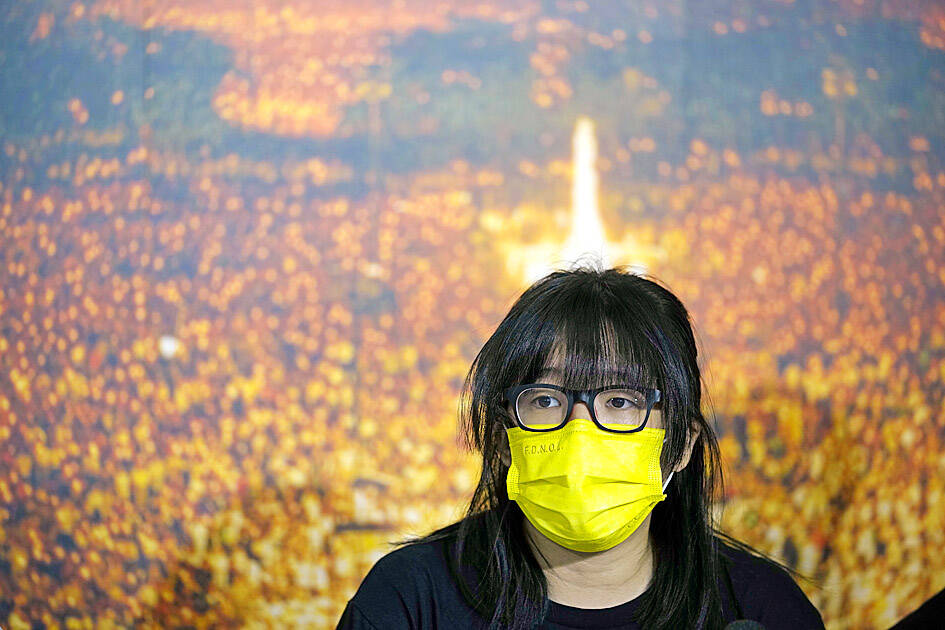Hong Kong police yesterday arrested a seventh person under the territory’s new security law in relation to social media posts about commemorating Beijing’s 1989 Tiananmen Square Massacre.
The latest arrest comes after an EU spokesperson said law enforcement actions suggest the new legislation “is used to stifle freedom of expression.”
Authorities said the 53-year-old woman taken in was suspected of “offenses in connection with seditious intention,” following the arrests of six people over the same case a day earlier.

Photo: AP
Hong Kong Secretary for Security Chris Tang (鄧炳強) had on Tuesday identified one of those arrested as Chow Hang-tung (鄒幸彤), a prominent activist who led the now-disbanded group that used to organize annual vigils to mark the Tiananmen Square Massacre.
The group of seven are the first people to be arrested under the “Safeguarding National Security Ordinance” — commonly referred to as Article 23 — which Hong Kong enacted in March and penalizes those found guilty of sedition with a prison term of up to seven years.
“The enforcement action is still ongoing, and the possibility of further arrests is not ruled out,” the National Security Department of the Hong Kong Police Force said yesterday.
Hong Kong used to be the only place on Chinese soil where people could openly mourn those who died on June 4, 1989, when the government sent troops and tanks to crush democracy demonstrations in Beijing.
Yet commemorative events have been driven underground in Hong Kong since Beijing’s crackdown on dissent, following huge pro-democracy protests in 2019.
A spokesperson for the EU yesterday said the “arrests seem to confirm the EU’s concerns about the new law and its effect on the rights and freedoms of the people of Hong Kong.”
“While we need to assess the details of the individual cases, the arrests suggest that the new law is used to stifle freedom of expression of the people of Hong Kong,” they said.
The EU “calls on the Hong Kong authorities to protect the ability of the people of Hong Kong to exercise their rights and freedoms,” the spokesperson said.
Amnesty International’s China director Sarah Brooks called the arrests a “shameful attempt to prohibit people from marking the upcoming anniversary.”
The government has weaponized the new security law to “silence critique,” despite warnings from UN human rights experts, Brooks said.
Chow is already serving more than 30 months in jail for other charges, including “unauthorized assembly” for her attempt to publicly commemorate June 4.
She and two other leaders of the group who organized the vigil are awaiting trial for another national security case, where they are accused of “incitement to subversion.”
Authorities connected Chow’s latest arrest to a Facebook page called “Chow Hang-tung Club,” which in the past few weeks has called on the public to write about their experiences related to Tiananmen vigils.
“We hope that all Hongkongers worldwide ... who have participated in the candlelight vigils over the past 30 years will write testimonies together,” one post read.
The vigil, which once drew tens of thousands to Hong Kong’s Victoria Park, has been banned since 2020.

CHAOS: Iranians took to the streets playing celebratory music after reports of Khamenei’s death on Saturday, while mourners also gathered in Tehran yesterday Iranian Supreme Leader Ayatollah Ali Khamenei was killed in a major attack on Iran launched by Israel and the US, throwing the future of the Islamic republic into doubt and raising the risk of regional instability. Iranian state television and the state-run IRNA news agency announced the 86-year-old’s death early yesterday. US President Donald Trump said it gave Iranians their “greatest chance” to “take back” their country. The announcements came after a joint US and Israeli aerial bombardment that targeted Iranian military and governmental sites. Trump said the “heavy and pinpoint bombing” would continue through the week or as long

TRUST: The KMT said it respected the US’ timing and considerations, and hoped it would continue to honor its commitments to helping Taiwan bolster its defenses and deterrence US President Donald Trump is delaying a multibillion-dollar arms sale to Taiwan to ensure his visit to Beijing is successful, a New York Times report said. The weapons sales package has stalled in the US Department of State, the report said, citing US officials it did not identify. The White House has told agencies not to push forward ahead of Trump’s meeting with Chinese President Xi Jinping (習近平), it said. The two last month held a phone call to discuss trade and geopolitical flashpoints ahead of the summit. Xi raised the Taiwan issue and urged the US to handle arms sales to

State-run CPC Corp, Taiwan (CPC, 台灣中油) yesterday said that it had confirmed on Saturday night with its liquefied natural gas (LNG) and crude oil suppliers that shipments are proceeding as scheduled and that domestic supplies remain unaffected. The CPC yesterday announced the gasoline and diesel prices will rise by NT$0.2 and NT$0.4 per liter, respectively, starting Monday, citing Middle East tensions and blizzards in the eastern United States. CPC also iterated it has been reducing the proportion of crude oil imports from the Middle East and diversifying its supply sources in the past few years in response to geopolitical risks, expanding

Pro-democracy media tycoon Jimmy Lai’s (黎智英) fraud conviction and prison sentence were yesterday overturned by a Hong Kong court, in a surprise legal decision that comes soon after Lai was jailed for 20 years on a separate national security charge. Judges Jeremy Poon (潘兆初), Anthea Pang (彭寶琴) and Derek Pang (彭偉昌) said in the judgement that they allowed the appeal from Lai, and another defendant in the case, to proceed, as a lower court judge had “erred.” “The Court of Appeal gave them leave to appeal against their conviction, allowed their appeals, quashed the convictions and set aside the sentences,” the judges